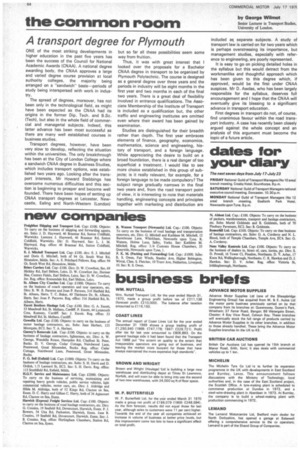A transport degree for Plymouth
Page 66

If you've noticed an error in this article please click here to report it so we can fix it.
ONE of the most striking developments in higher education in the past five years has been the success of the Council for National Academic Awards (CNAA). A national degree awarding body, the CNAA approves a large and varied degree course provision at local authority colleges, the majority being arranged on a ''sandwich" basis—periods of study being interspersed with work in industry.
The spread of degrees, moreover, has not been only in the technological field, as might have been expected as the CNAA had its origins in the former Dip. Tech. and B.Sc. (Tech), but also in the whole field of commercial and managerial subjects. Indeed, this latter advance has been most successful as there are many well established courses in business studies.
Transport degrees, however, have been very slow to develop, reflecting the situation within the universities. The only breakthrough has been at the City of London College where a sandwich CNAA degree in Business Studies, which includes transport options, was established two years ago. Looking after the transport interests, Mr Howard Stebbings has overcome numerous difficulties and this section is beginning to prosper and become well founded. There have been hopes of setting up CNAA transport degrees at Leicester, Newcastle, Ealing and North-Western (London) but so far all these possibilities seem some way from fruition.
Thus, it was with great interest that I looked over the proposals for a Bachelor CNAA degree in transport to be organized by Plymouth Polytechnic. The course is designed as a general degree over three years and the periods in industry will be eight months in the first year and two months in each of the final two years. There is a great deal of flexibility involved in entrance qualifications. The Associate Membership of the Institute of Transport is included as a qualification but, the other traffic and engineering institutes are omitted even where their award has been gained by examination.
Studies are distinguished for their breadth rather than depth. The first year embraces elements of finance, geography, economics, mathematics, science and engineering, history of transport, and a foreign language. While appreciating the desire to build on a broad foundation, there is a real danger of too superficial a treatment. I would like to see more choice established in this group of subjects; is it really relevant, for example, for a foreign language to be made compulsory? The subject range gradually narrows in the final two years and, from the road transport point of view, it is interesting to note that materials handling, engineering concepts and principles together with marketing and distribution are included as separate subjects. A study of transport law is carried on for two years which is perhaps overstressing its importance, but management studies, especially with reference to engineering, are poorly represented.
It is easy to go on picking detailed holes in the syllabus but this would detract from the workmanlike and thoughtful approach which has been given to this degree which, if approved, would be the first under CNAA auspices. Mr D. Awdas, who has been largely responsible for the syllabus, deserves full encouragement and I hope that the CNAA will eventually give its blessing to a significant advance in transport education.
First degrees in transport do not, of course, find unanimous favour within the road transport industry. A case has recently been closely argued against the whole concept and an analysis of this argument must become the topic of a future article.








































































































